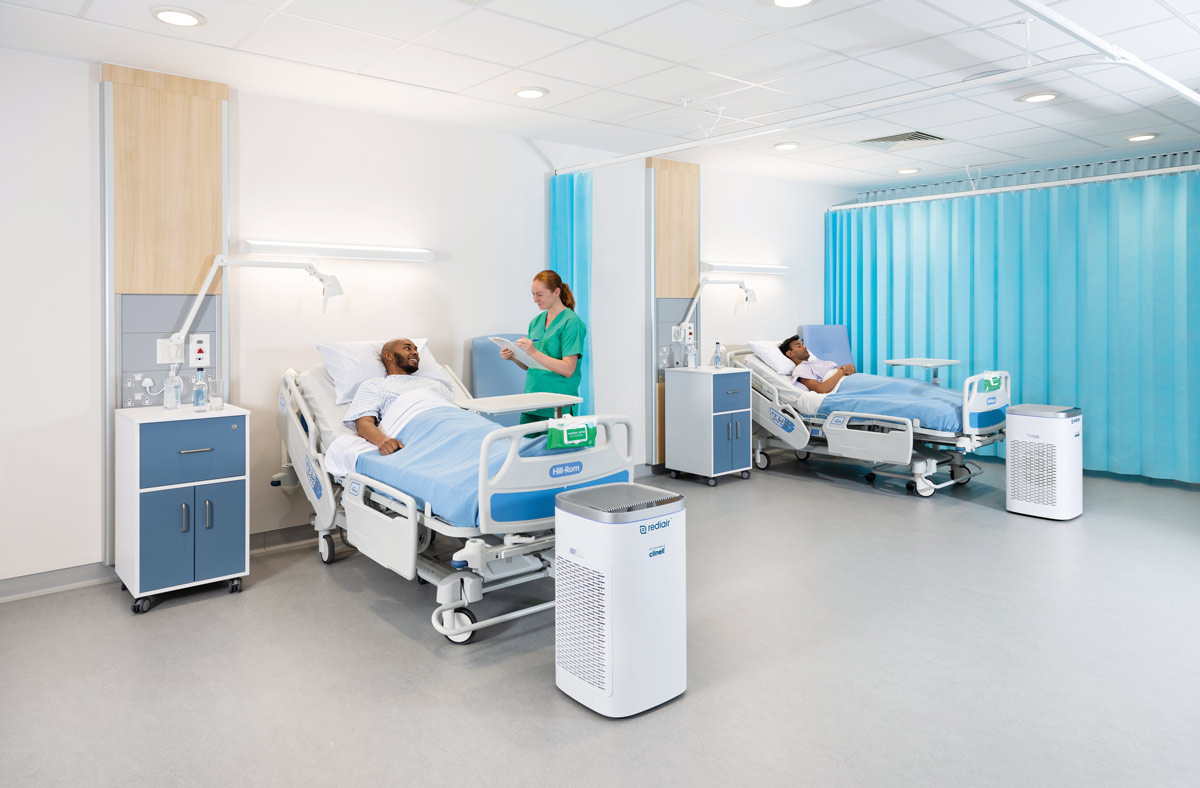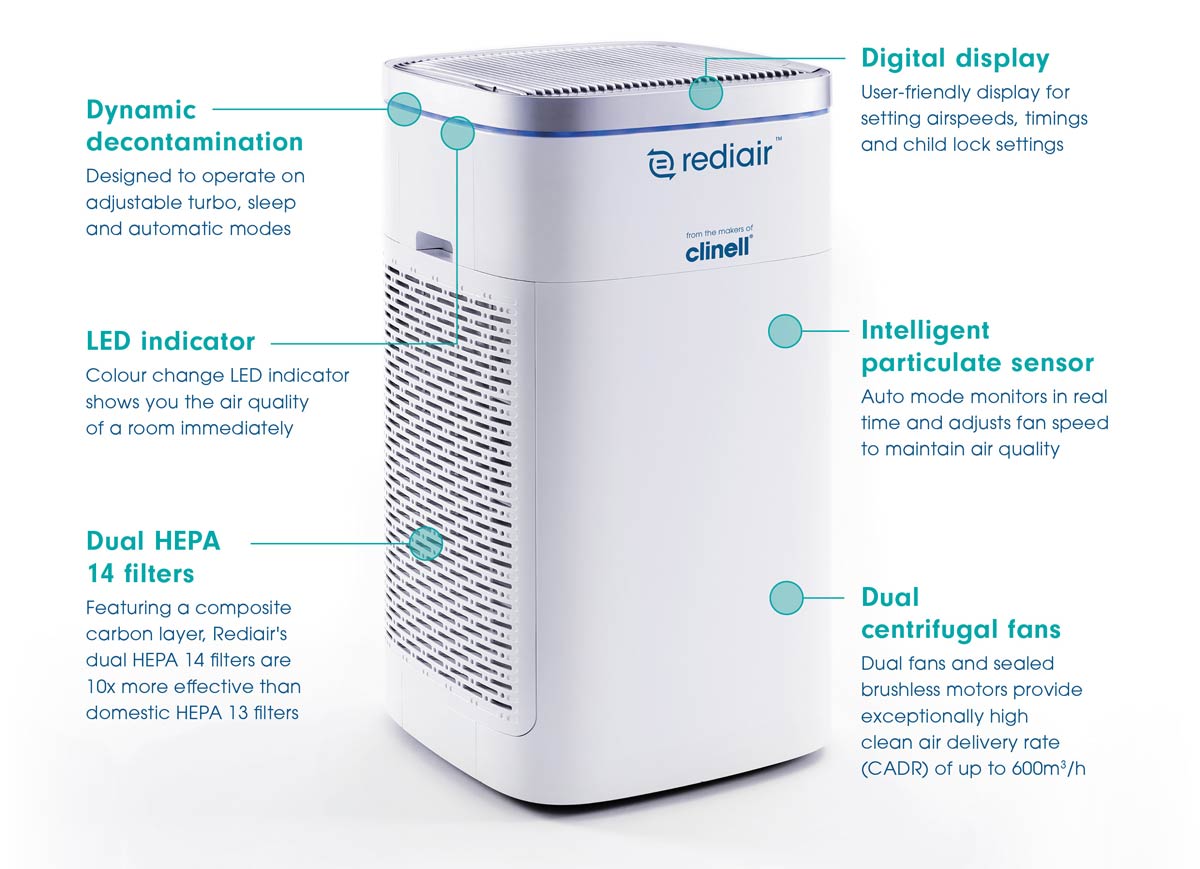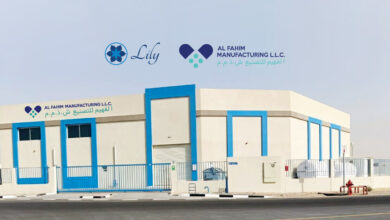
Environmental decontamination and hand hygiene are universally recognised to reduce the risk of infections and keep people safe. However, adequate ventilation is vital for ensuring the air within hospitals is safe.
Aerosols and droplets carry infectious microorganisms in the air that can spread infections more easily within poorly ventilated spaces1.
Effective air filtration devices can help remove these microorganisms and particulates from the air.
Air filtration devices draw the air through the machine, trap the contaminants within a HEPA filter and blow clean air back into the room, significantly increasing the air quality.
Aerosol & droplet transmission
We constantly release bacteria, viruses and fungi into the air around us. Pathogens like Mycobacterium tuberculosis, influenza, RSV and coronaviruses are found in droplets and aerosols expelled when we talk, cough or even breathe, potentially infecting other people or landing on and contaminating surfaces.
Until recently, it has been accepted that Droplets are particles above 5 micrometres (µm) in diameter that typically settle within 2 metres, while aerosols are smaller particles (below 5µm) that remain airborne longer and spread over large distances.
There is currently a growing body of evidence to suggest that this might not be true.2 Infectious aerosols can be inhaled, deposited on our susceptible mucous membranes or transferred to our mucous membranes by contaminated hands.
Benefits of air filtration
Portable HEPA filters can reduce the risk of inhaling viable pathogens within a poorly ventilated area1. Unlike traditional air filtration systems found in shared spaces, portable air filtration devices give you the flexibility to provide clean air where & when you need it.
Air filtration devices can capture a variety of contaminants such as:
- Airborne pathogens (bacteria, fungi & viral aerosols)
- Fine and ultra-fine particles
- Dust
- Mites
- Odours
- Pet dander
Air filtration in healthcare
Healthcare facilities such as operating theatres or intensive care units will already have specialised fixed mechanical ventilation systems installed. However, in open wards & shared spaces, hospitals might lack effective air filtration and installing cumbersome, fixed mechanical systems can be difficult.

Rediair
Designed by infection prevention experts, Rediair is a portable air purification device that captures particles as small as 0.3m and has a CADR rate of up to 600m3/hr.
Dual HEPA 14 filtration
At the heart of Rediair are two carbon composite HEPA 14 filters that work in tandem with the dual centrifugal intake fans and easy-to-clean nylon pre-filters to capture particulates, odours and 99.995% of airborne pathogens.
High clean air delivery rate
Due to its dual-intake filtration system, Rediair has an exceptionally high clean air delivery rate (CADR) of up to 600m3/h. Despite its small form factor, a single unit provides effective ventilation for rooms up to 120m3.
Ultra-low noise
Rediair is surprisingly quiet when in normal use. Featuring many different settings and speeds, Rediair is a powerful air filtration unit designed to operate without causing distraction.
Rediair’s four different operating modes and a small form factor allow Rediair to be used almost anywhere from waiting rooms & open wards to offices and triage rooms.
Flexible filtration
Rediair’s dual HEPA 14 & carbon cloth composite filters decontaminate a room’s air almost instantly. Plug in, select your mode and let Rediair do the rest; it’s that simple. Adaptable to many different situations, Rediair has four operating modes to choose from:
Automatic mode
When set to automatic mode, Rediair uses intelligent particulate sensing to detect air quality and automatically adjusts the fan speed to effectively remove contaminants whilst displaying the current air quality via its LED air quality indicator.
Manual Mode
Rediair’s manual mode offers complete control and allows you to tailor its operating parameters to whatever situation you need. Navigating through its simple digital display to select fan speeds, operating times and light modes, Rediair offers you quick and simple to use air purification.
Turbo Mode
Turbo mode spins both centrifugal intake fans at top speed, significantly increasing its clean air delivery rate (CADR) up to 600m3/h, removing contaminants more quickly and effectively.
Night mode
When set to night mode, Rediair uses its built-in light sensor to monitor the room’s light. Rediair will switch off all LEDs & displays and lower fan speeds when light levels fall to provide near-silent decontamination throughout the night.
Rediair is an incredibly subtle air filtration device; ultra-quiet fans and light reduction settings mean that Rediair can operate without distraction. While the internal mechanisms are complex, using Rediair is quite the opposite. The intelligent air quality indicator can read the quality of the surrounding air and start decontamination within seconds of activation.

GAMA Healthcare is an infection prevention expert working to reduce the risk of infection to help save and improve lives. For more information about our business and products, please visit
1. Pirkle S, Bozarth S, Robinson N, et al. Evaluating and contextualizing the efficacy of portable HEPA filtration units in small exam rooms. American Journal of Infection Control. 2021;49(12):1506-1510. doi:10.1016/j.ajic.2021.08.003
2. Dancer SJ, Tang JW, Marr LC, Miller S, Morawska L, Jimenez JL. Putting a balance on the aerosolization debate around SARS-CoV-2. Journal of Hospital Infection. 2020;105(3):569-570. doi:10.1016/j.jhin.2020.05.014














